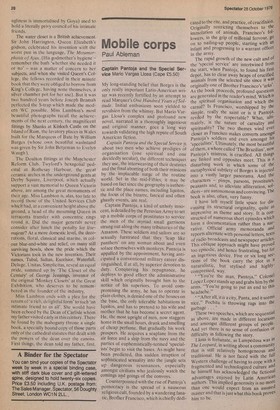Mobile corps
Paul Ableman
Captain Pantoja and the Special Service Mario Vargas Lima (Cape £5.50) My long-standing belief that Borges is the only really important Latin-American writer was recently fortified by an attempt to read Marquez's One Hundred Years of Solitude. Initial enthusiasm soon yielded to revulsion from the whimsy. But Mario Vargas Llosa's complex and profound new novel, narrated in a thoroughly ingenious and original manner, goes a 'long way towards validating the high repute of South American fiction.
Captain Pantoja and the Special Service is about two men who achieve prodigies 01 organisation (one spiritual and one decidedly secular), the different techniques they use, the interweaving of their destinies and the final aborting of both their missions by the implacable surge of the routine world. Set in the mid-Fifties, it may be based on fact since the geography is authentic and the place names, including Iquitos, the focus of the bizarre, farcical and often ghastly events, are real.
Captain Pantoja, a kind of unholy innocent, is detailed by the Peruvian Army to set up a mobile corps of prostitutes to service the men of the myriad small garrisons strung out along the many tributaries of the Amazon. These soldiers and sailors are so sexually furstrated that they 'leap like panthers' on any woman about and even solace themselves with monkeys. Pantoja is appalled by the appointment, having anticipated a conventional military career distinguished, if at all, by superior devotion to duty. Conquering his repugnance, he deploys to good effect the administrative skill which originally brought him to the notice of his superiors. To avoid compromising the army, he has to operate in plain clothes, is denied one of the houses on the base, the only tolerable habitations in Iquitos, and has to pretend to his wife and mother that he has become a secret agent. He, the most upright of men, now staggers home in the small hours, drunk and smelling of cheap perfume. But gradually his work prospers. He acquires a seaplane from the air force and a ship from the navy and the parties of euphemistically-termed 'specialists' begin to visit the bases. As might have been predicted, this sudden irruption of sophisticated sexuality into the jungle sets up dangerous resonances, especially amongst civilians who jealously watch the comings and goings of the convoys.
Counterpointed with the rise of Pantoja's pomocracy is the spread of a nauseous religious cult, founded by a wandering fanatic, Brother Francisco, which is chiefly dedi cated to the rite, and practice, of crucifixion, Originally restricting themselves to the immolation of animals, Francisco's followers, in the grip of millenial fervour, go on to nailing-up people, starting with an infant and progressing to a warrant officer in the army. The rapid growth of the new cult and of the 'special service' are intertwined from the start, when Pantoja, to found his first depot, has to clear away heaps of crucified animals from the selected site since it was originally one of Brother Francisco's 'arks'. As the book proceeds, profound questions are generated in the reader's mind. Which 15 the spiritual organisation and which the carnal? Is Francisco, worshipped by the simple, really the saint or is it Pantoja, reviled by the respectable? What, tilt/. mately, is the nature of carnality and spirituality? The two themes wind ever closer as Francisco makes converts amongst Pantoja's soldiers and even amongst his 'specialists'. Ultimately, the most beautiful of them, a whore called 'The Brazilian', now Pantoja 's mistress, is crucified. All things are linked and opposites meet. This is a disturbing work in which some of the metaphysical subtlety of Borges is injected into a vastly larger panorama. And the characters — nit" parsons, prostitutes, peasants and, to alleviate alliteration, soldiers— are autonomous and convincing. The book is also, often, very funny. I have left myself little space for dis' cussing its structural originality, quite as impressive as theme and story. It is con' structed of numerous short episodes which form a documentation rather than a nar' rative. Official army memoranda and reports alternate with personal letters, teXtS of radio broadcasts and newspaper articles. This oblique approach might have proved too episodic, and hence frustrating, but for an ingenious device. Five or six long sections of the book carry the plot in naturalistic, but stylised and highlycora pressed, way. "You're the man, Pantoja," Colonel Lopez Lopez stands up and grabs him by the arms. "You're going to put an end to this headache."
"After all, his a city, Panta, and it seems nice," Pochita is throwing rags into the garbage. These two speeches, which are sequential as above, are made in different locations and amongst different groups of people. And yet there is no sense of confusion or difficulty in following the story. Llosa is foitunate, as Lampedusa was in The Leopard, in writing about a community. that is still relatively homogeneous and traditional. He is not faced with the foil Western challenge of having to cope with a fragmented gmented and technologized culture and he himself has acknowledged the fictional advantages enjoyed by Latin American authors. This implied generosity is no more than one would expect from an assured master and that is just what this book proves him to be.






































 Previous page
Previous page